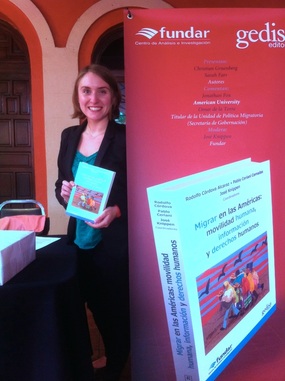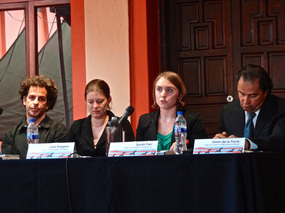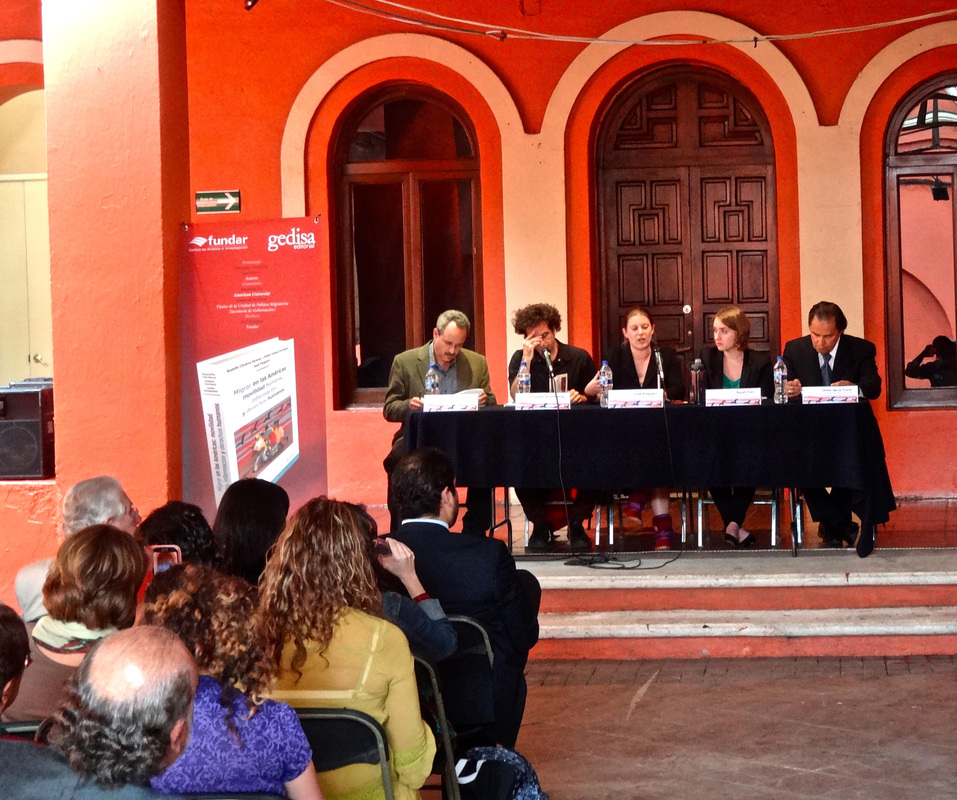Article abstractThe hiring of Mexican workers for temporary employment in the United States is a transnational process with little transparency and accountability in which thousands of Mexicans have suffered from fraud and abuse. The program structure, controlled by employers, allows and encourages the use of agents and subcontractors and lacks the mechanisms to protect potential migrants. The nearly complete lack of public and accessible information encourages the violation of migrants’ rights. This article (1) presents an analysis of how the H-2A and H-2B programs work, (2) explains the legal and regulatory frameworks of the programs, (3) explores current problems in access to public information about recruitment, (4) explains the work that CDM has done to access public information through the Federal Institute of Access to Information and Data Protection (IFAI, the acronym in Spanish) in Mexico and the Freedom of Information Act (FOIA) in the United States, (5) argues that both governments must guarantee free and timely access to public information for migrants so they may protect themselves from fraud and abuse, and (6) proposes a series of changes to transparency laws so that they meet the needs of migrant workers. Key words: Labor recruitment; temporary work; H-2A visa; H-2B visa; migrant workers; labor rights violations; right to access public information; Freedom of Information Act (FOIA); Instituto Federal de Acceso a la Información y Protección de Datos (IFAI) The following is a summary of my remarks during the presentation of Migrar en las Américas on July 24, 2014, in the Museo de las Culturals Populares in Mexico City, Mexico.
One component of this Project is an ongoing campaign to collect public information related to the actors involved in the recruitment of Mexican migrant workers for H-2 employment in the U.S. This article is a reflection of the level of access by migrant workers and advocacy organzations to key information about labor recruitment and the H-2 program. Key characteristics of the H-2 temporary work visa program
Once the employer has received authorization from the U.S. government, they must enter the process of recruiting workers to fill the positions. This is where the recruiter and recruitment agency become involved. Many employers have very little practical ability to conduct recruitment themselves--lack of Spanish language ability, lack of time/resources to travel to Mexico to search for workers, lack of knowledge of where to look to hire workers. Recruiters and recruitment agencies able to fill this niche, connecting migrant workers in Mexico with employers in the U.S. Finally, I want to underscore two important characteristics of the H-2 temporary visa program, which are made evident by the process I have just described. (1) The employer, and his recruiting agents, control the process. A Mexican worker who wishes to travel to the U.S. for legal, temporary work cannot self-petition for an H-2 visa. In general, temporary employment visas can only be requested by the employer, not the worker. The worker must be specifically chosen by an employer who has received authorization and presented with a specific employment offer. (2) The recruiter holds the most power. Under the current regime, power is concentrated in the hands of the recruiting agent since he or she is the one who decides who gets an employment offer and who doesn't. This immense power causes many opportunities for abuse, most commonly in the form of black lists or recruitment fraud. The importance of accessible informationWe began our access to public information campaign with a substantial understanding of the problems associated with recruitment in Mexico for H-2 jobs in the U.S. Nearly all of these problems are, in some way, related to a general lack transparency related to recruitment and the H-2 visa program and low levels of access to that information which is made available to the public. One of the most immediate problems faced by temporary migrant workers is recruitment fraud. Recruitment fraud is an instance in which a self-proclaimed recruiter arrives in a community, offering legal employment in the U.S. and normally charging a fee for his services, and later fails to deliver the on his promise. Sometimes the fraud comes in the form of false claims about employment terms: higher salaries than those that will actually be paid, or work in an industry different than the actual job. This type of recruitment fraud is, unfortunately, quite common. In other instances, a supposed recruiter might be "recruiting" for a non-existent job, charging money or demanding personal documents, and then disappearing without ever procuring visas for the migrant workers. In a 2013 report published by CDM, Recruitment Revealed, we found that 10% of the migrant workers we surveyed had paid a fee for a non-existent job at least once. Many workers with whom I have talked have been victims of this kind of fraud on multiple occasions. At the moment that a migrant worker receives an employment offer from an unfamiliar recruiter, there are very few resources available to help him or her ascertain whether the job offer is legitimate or not. In many cases, the economic necessity is so great that workers are forced to make a decision, often to pay a recruitment fee or surrender their personal documents, without knowing whether the offer is legitimate or fraudulent. Conclusions: insufficient information, generally inaccessibleOur access to public information project had two, principle components: (1) an analysis of the public information that is currently available to the public; (2) a campaign of petitions under U.S. and Mexican transparency laws. Our analysis of currently available public information found that the information related to recruitment the H-2 temporary employment program is generally incomplete or otherwise insufficient to serve as a tool for workers to avoid recruitment abuses, such as recruitment fraud. We also found that the format of its publication generally renders it inaccessible to the migrant worker population because of language and computer literacy barriers.
Our analysis of the transparency laws of both countries as a means of accessing timely information about recruitment found them to be similarly inadequate. CDM, with the support of the Washington College of Law at American University and Fundar, Centro de Análisis e Investigación, submitted 13 requests under the Freedom of Information Act (FOIA) in the U.S. and 62 requests to the Instituto Federal de Acceso a la Información y Protección de Datos (IFAI) in Mexico. We divided our analysis of these two mechanisms into two categories: process and quality of information. First, we found that the process was in general very slow. For example, the average response time to our FOIA requests that received a response at all, was 480 days. The response time for IFAI was better, at 58 days on average. The process was also expensive: the average cost for our 62 IFAI requests was approximately $465 USD (the median was much less, around $7, given that a few of the requests generated a cost of over $10,000). On the FOIA side, many of requests included costs of tens of thousands of dollars. In these cases we petitioned fee waivers, which were difficult to win and significantly prolonged the response time. Finally, we found that both processes were very complicated, requiring knowledge of the legal framework and a detailed understanding of the responsibilities of different government agencies, especially in the case of the IFAI. Regarding the information we were able to extract using petitions to transparency laws, we found that it was often insufficient for the purpose of preventing many of the most egregious recruitment abuses. Most importantly, neither government maintains an up-to-date registry of legitimate recruiting agents. Mexican law , specificially the Reglamento de Agencias de Colocación de Trabajadores (RACT), requires all worker placement agencies to register with the Secretaria de Trabajo y Previsión Social (Labor Secretary). However, after requesting all documents related to the RACT registry, CDM found that this recruiter registry was inadequate as a tool for migrant workers navigating the recruitment process. First, the RACT applies to all types of organizations and individuals who facilitate the placement of workers in employment opportunities. This means that anything from domestic temp agencies to H-2 recruiters should, in theory, be required to register. However, the registry does not distinguish the type of job placement services provided by the actor, making it nearly impossible to distinguish a domestic temp agency from an international labor recruiter. After careful revision, CDM found 21 actors of 438 that mention services abroad. Of those, only 7 explicitly mention a relationship to employment in the U.S. CDM alone is aware of at least 100 distinct actors involved in the recruitment of H-2 workers, and this number is probably much higher. Additionally, much of the registry was wrought with inconsistencies. For example, we found recruitment agencies that had submitted notice of new branch offices (as required by the RACT) but had no official registration number. We also found at least one case of a H-2 recruitment agency that had been inspected by the Labor Secretary and found to be in violation of the RACT. After the inspection, the agency in question never appears in the registry and CDM is aware that they continue to recruit in violation of the RACT. Viewing these access to information mechanisms from the perspective of a migrant worker navigating the recruitment process or, more specifically, from that of a migrant worker contemplating an imminent recruitment offer, it is clear that they are completely inadequate. More importantly, the failure of both governments to provide the public with access to key information in a timely and accessible format, places migrant workers directly at risk for violation of their civil and labor rights. // SEF // Mexico City, Mexico Comments are closed.
|
archives
January 2022
categories
All
disclaimerThe views expressed in this blog and on this website are my own.
|



 RSS Feed
RSS Feed